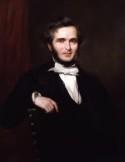
1816 - 1880 Person Name: J. Curwen Composer of "[Brightly glows the day]" in Little Pilgrim Songs Curwen, John, son of the Rev. S. Curwen, of an old Cumberland family, born at Heckmondwike, Yorkshire, Nov. 14, 1816, and educated at Coward College, and University College, London. In 1838 he became assistant minister in the Independent Church, Basingstoke; co-pastor at Stowmarket in 1841, and pastor at Plaistow, Essex, in 1844. There he developed and promoted the Tonic Sol-fa method of teaching to sing, using it in his own schools and church, and lecturing upon it in various parts of the country. Resigning his ministry through ill health, in 1867, he established a printing and publishing business in order the better to create a Tonic Sol-fa literature. In 1853 he assisted in founding the Tonic Sol-fa Association, for the promotion of that method of singing, and in 1862 the Tonic Sol-fa College. He died May 25, 1880. Besides a number of works explanatory of the Tonic Sol-fa system, Mr. Curwen was the compiler of Sacred Songs, 1840, and Hymns & Chants, 1844. In 1846 these were combined as The Child's Own Hymn Book. This was enlarged in 1865, and recast as The New Child’ s Own Hymn Book in 1874. As a Sunday-school hymn-book this collection has been exceedingly and deservedly popular.
For it Mr. Curwen composed two hymns:—
1. I'm a little Pilgrim. Pressing Heavenwards. This was written in place of another with the same first line, whose author had refused permission for its use in Mr. Curwen's book. The time and chorus usually sung with it are American.
2. 0 what has Jesus done for me? Passiontide. This was also written in place of another having the same line.
These are the only hymns known to be his The Sabbath Hymn Book, Lond. 1859, was also edited by Mr. Curwen. [Rev. W. R. Stevenson, M.A.]
--John Julian, Dictionary of Hymnology (1907)
John Curwen

